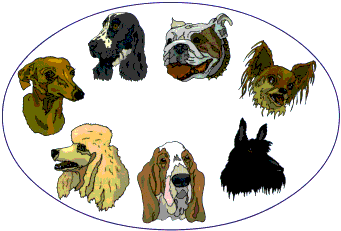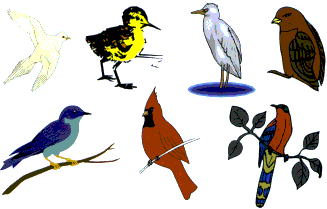
"Micro/Macro-ing" Evolution
 There
are many factors which have complicated the evolution--creation
picture over the past 30 years, but the one which has had the most
dramatic effect has undoubtedly been the confusion in meaning of words.
I have had people state that they believe in evolution as if that
belief were a strength while others understood it to be a weakness. It
turned out that the two people involved were talking about two
completely different understandings of what the word evolution means.
One understood evolution to mean change and the other was referring to
a particular version of Neo-Darwinism.
There
are many factors which have complicated the evolution--creation
picture over the past 30 years, but the one which has had the most
dramatic effect has undoubtedly been the confusion in meaning of words.
I have had people state that they believe in evolution as if that
belief were a strength while others understood it to be a weakness. It
turned out that the two people involved were talking about two
completely different understandings of what the word evolution means.
One understood evolution to mean change and the other was referring to
a particular version of Neo-Darwinism.
In the last 20 years, a variety of adjectives have been coined to modify the meaning of the word evolution: theistic evolution, mitigated evolution, social evolution, nuclear evolution, biochemical evolution, physical evolution, microevolution, macroevolution, cladistic evolution, and on and on. In every one of these cases, there is more than one understanding about what the adjective means. Some proponents of microevolution are referring to changes that occur on a molecular level, a level that humans cannot directly observe. Other people use the term microevolution to refer to small changes or variations in a particular form of life. A group of dogs like cocker spaniels, poodles, and cockapoos would be classified as microevolution by some people in both the scientific and religious communities. In the same way, macroevolution may be used to refer to any change at the level of an organism or it can be used to refer to a major change from two forms of life that do not appear to be related--a fish and a bird for extreme examples.

The problem with all of this is that a good percentage of those discussing this subject and using these words do not understand what the scientific evidence is or what is possible in living organisms. We would like to take a shot at it here in this article and hope that by simplifying the subject, we can be helpful to those who are wrestling with this subject.
Macroevolution is an end, not a process. Many peopleseem to feel that microevolution and macroevolution are two separate processes with different ends. The idea seems to be that a pair of fish gave rise to a bird, to use the extreme example cited earlier. No reputable evolutionist believes that or would present it as a possibility. Macroevolution is not a process. Those who promote macroevolution are suggesting that microevolutionary changes can occur over and over so that the end result of a series of microevolutionary changes is a major difference of such a magnitude that no clear relationship can now be seen between the two forms of life.In man's recorded history there have been incredible changes
produced in cattle, chickens, fish, horses, dogs, and cats. Who would
believe that a Chihuahua and a Saint Bernard are the same species? If
you laid their bones on a table would anyone guess that they have a
common ancestor? The diversity in humans is incredible. Compare a pygmy
with a Swede or Japanese sumo wrestler with a Chinese ballet dancer.

Evolutionists assume that because there is such enormous change apparent in biological systems, that there are no limits to what micro-evolution can produce given enough time. As research into the nature of genetic material, the history of earth, and agents that can affect and control microevolution have continued, it has become increasingly obvious that there are limits and that current models and understandings are inadequate. The old "Tree of Evolution" model of the past is being reconsidered by many evolutionists with the idea of many separate starts to life being seen as more consistent with the evidence.
All of this brings the subject closer to the biblical explanation, reducing the controversy over evolution. The Genesis account identifies separate starts for broad groupings of animals (see Genesis 1:20-28, 1 Corinthians 15:39, and Genesis 6). The original words used in these verses are very general. Flesh of fish is a very broad term and can include everything from a shark to a guppy to a catfish. In modern times, we have seen the common carp become a beautiful goldfish and a wide variety of new sportsfish like the coho of the Great Lakes or the Texas striped bass of the Lone Star State. The flesh of birds would include such diverse forms as hummingbirds to ostriches to penguins. I have been told by a chicken farmer friend of mine that there are 149 kinds of chickens, and there are huge differences in how they look and function, all produced by microevolution.
Suppose it is biologically proven and fossils verify that the
dinosaurs were birds. Would that pose a biblical problem? Can flesh of fowl include a dinosaur?
If we understand the meaning of "kind" correctly in the Bible and
realize that change can produce great diversity in life forms, this
should not be an issue. Suppose the dinosaurs turn out not to be
related to the birds. Could they be flesh
of fish? It may also be that they are simply not discussed in
the Bible because their existence is irrelevant to the biblical message.

 When people play slot machines, they are playing a
device that works
on chance. The wheels that turn displaying the symbols are not
mechanically stopped to make people lose their money. The machines are
designed, however, so that over the long haul the house will give less
money than it gains. It is the design of the system that causes the
machine to produce its desired effect, and that result will always
happen. The fact that by chance someone might win at a given pull
excites people to think they will defeat the system. They will not.
When people play slot machines, they are playing a
device that works
on chance. The wheels that turn displaying the symbols are not
mechanically stopped to make people lose their money. The machines are
designed, however, so that over the long haul the house will give less
money than it gains. It is the design of the system that causes the
machine to produce its desired effect, and that result will always
happen. The fact that by chance someone might win at a given pull
excites people to think they will defeat the system. They will not.
 When the sperm meets the egg in human reproduction, does
God design
every trait that the new baby will have? If you say "yes," then you are
saying that God designs birth defects and horrible genetic diseases
into mankind. It seems to this writer that God functions in a more
distant way, allowing His intelligence to be seen in the system, but
allowing changes brought about by Satan to vicariously alter the system.
When the sperm meets the egg in human reproduction, does
God design
every trait that the new baby will have? If you say "yes," then you are
saying that God designs birth defects and horrible genetic diseases
into mankind. It seems to this writer that God functions in a more
distant way, allowing His intelligence to be seen in the system, but
allowing changes brought about by Satan to vicariously alter the system.
There are many situations in the cosmos and in biological systems like this. The design of gravity mandates that when matter comes near matter there will be an attraction that will cause the matter to clump. This allows stars, planets, moons, and other astronomical objects to come into existence and continue to sustain mankind. The laws of electricity and magnetism control chemical reactions and lead matter to its ultimate condition of stability. It is the design of all of this that allows us to eat and to vary our diets. The role of chance in our lives should not be twisted into a controversy between atheists and theists, but rather a careful discussion of what we mean by chance and its application to our lives.
Even in our prayer lives as individuals, God does not force us to accept the design He builds into our lives. God may give us a talent or an opportunity but it is still up to us as to whether we will accept the solution He gives us to the request that we made. We do not wish to suggest that this is the only way God can function, but the reason we do not always feel God has answered our prayers is that we do not understand the methods by which He functions.
Causal agents and evolution. One of the major errors ofevolutionists has been the failure of the proponents of various theories of evolution to produce a causal agent at critical levels of their theories. The fact that time, space, and energy all seem to have had a beginning means that there had to be a cause. Otherwise you have to assume that something can come from absolutely nothing, an assumption which invalidates all of the conservation laws of science. If it is agreed that there was a cause, then we have a strong argument for the existence of God. A similar problem occurs when we look at the origin of
life. Most
people living in the twenty-first century are aware of the Miller/Urey
experiment in which methane, water vapor, ammonia, and nitrogen were
subjected to an electrical discharge and amino acids, the building
blocks of life, were produced. A superficial glance at all of this
would suggest that the electrical discharge was the cause of the amino
acids and the only other necessary ingredient was time. The first
problem is that the evidence does not support this combination of gases
as being present in the atmosphere of the primitive earth. There is
compelling evidence that there was oxygen and carbon dioxide in the
earth's early atmosphere and virtually no evidence of significant
amounts of ammonia. The second problem is that the Miller/Urey
apparatus had a major design feature which allowed for the production
of amino acids. This design feature was a trap that pulled the amino
acids away from the electrical discharge as soon as they were formed.
Without the trap, the Miller/Urey apparatus destroyed amino acids
10,000 times faster than it formed them. It is pretty obvious that the
primitive earth's atmosphere has very little in common with the
Miller/Urey apparatus. Causal agent theories continue to become more
and more imaginative, from alien seeding of DNA to comets bringing
complex molecules, but the lack of valid causal agents makes all
evolutionary theories suspect at best.
A similar problem occurs when we look at the origin of
life. Most
people living in the twenty-first century are aware of the Miller/Urey
experiment in which methane, water vapor, ammonia, and nitrogen were
subjected to an electrical discharge and amino acids, the building
blocks of life, were produced. A superficial glance at all of this
would suggest that the electrical discharge was the cause of the amino
acids and the only other necessary ingredient was time. The first
problem is that the evidence does not support this combination of gases
as being present in the atmosphere of the primitive earth. There is
compelling evidence that there was oxygen and carbon dioxide in the
earth's early atmosphere and virtually no evidence of significant
amounts of ammonia. The second problem is that the Miller/Urey
apparatus had a major design feature which allowed for the production
of amino acids. This design feature was a trap that pulled the amino
acids away from the electrical discharge as soon as they were formed.
Without the trap, the Miller/Urey apparatus destroyed amino acids
10,000 times faster than it formed them. It is pretty obvious that the
primitive earth's atmosphere has very little in common with the
Miller/Urey apparatus. Causal agent theories continue to become more
and more imaginative, from alien seeding of DNA to comets bringing
complex molecules, but the lack of valid causal agents makes all
evolutionary theories suspect at best.
Factual evolution and theories of evolution. The most fundamental problem in the evolution/creation controversy is not over whether or not evolution happens; very few creationists are irrational enough to maintain that one minute after the creation week, there were cockapoos. Charolais cattle, coho salmon, goldfish, Rhode Island red chickens, hybrid T corn, Nancy Reagan roses, and a variety of other examples could be given of living things that have evolved within the recorded history of mankind. Most people in their every-day experiences come to realize that racial variations in human physical characteristics are related to environmental factors. You cannot garden or keep an orchard or fight weeds in your yard without learning about how living things change and adapt.
The question is how far can this microevolutionary change go? The whole debate about evolution is not about whether it happens, but about how much change can take place and what the causal agents are of the change. Those who favor punctuated equilibrium might disagree with strict neo-Darwinism, but the debate is over mechanisms and process. What is ironic is that the Bible does the same thing. When Jacob manipulates Laban's flocks, we see something that sounds very much like modern bovine husbandry, but we do not have it spelled out exactly what was done or how.
 The bottom line is that the Bible has no quarrel with
factual
evolution--cockapoos and Highland kews of Scotland do not conflict with
the Genesis account. What the Bible does have a quarrel with are human
theories that attempt to provide explanations based on causal agents
that exclude God as an intelligent, rational, purposeful causer.
Science and faith are cooperative, positive, symbiotic, constructive
partners in all aspects of human experience. If there is a conflict, we
either have bad science or bad theology. The lesson of history is that
there has been a lot of both.
The bottom line is that the Bible has no quarrel with
factual
evolution--cockapoos and Highland kews of Scotland do not conflict with
the Genesis account. What the Bible does have a quarrel with are human
theories that attempt to provide explanations based on causal agents
that exclude God as an intelligent, rational, purposeful causer.
Science and faith are cooperative, positive, symbiotic, constructive
partners in all aspects of human experience. If there is a conflict, we
either have bad science or bad theology. The lesson of history is that
there has been a lot of both.
Back to Contents Does God Exist?, SepOct04.